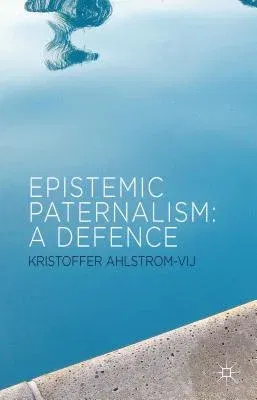Kristoffer Ahlstrom-Vij
(Author)Epistemic Paternalism: A Defence (2013)Hardcover - 2013, 20 August 2013

Qty
1
Turbo
Ships in 2 - 3 days
In Stock
Free Delivery
Cash on Delivery
15 Days
Free Returns
Secure Checkout

Print Length
194 pages
Language
English
Publisher
Palgrave MacMillan
Date Published
20 Aug 2013
ISBN-10
0230347894
ISBN-13
9780230347892
Description
Product Details
Author:
Book Edition:
2013
Book Format:
Hardcover
Country of Origin:
US
Date Published:
20 August 2013
Dimensions:
21.84 x
14.22 x
2.29 cm
ISBN-10:
0230347894
ISBN-13:
9780230347892
Language:
English
Location:
London
Pages:
194
Publisher:
Weight:
476.27 gm